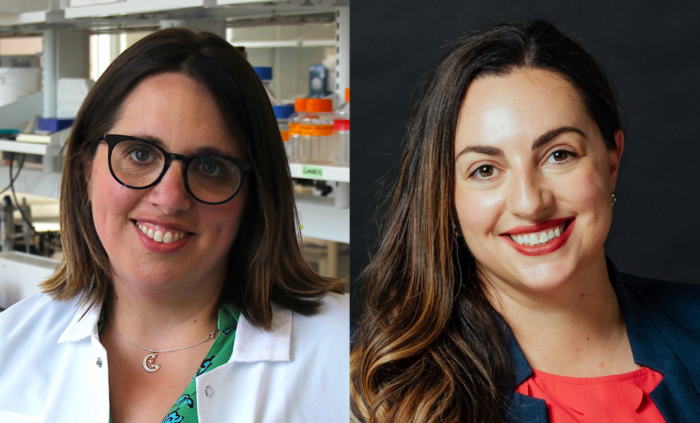Most of us want to get rid of fat. Jennifer Munson and Evangelia Bellas just want to understand it.

Credit: Matt Chittum for Virginia Tech
Most of us want to get rid of fat. Jennifer Munson and Evangelia Bellas just want to understand it.
Munson, associate professor at the Fralin Biomedical Research Institute at VTC, and Bellas, assistant professor in the Department of Bioengineering at Temple University, were recently awarded $250,000 by the Lipedema Foundation to research causes and treatments for lipedema, an often painful disease characterized by a build-up of fat tissue in the limbs. The two are co-principal investigators for the grant.
Lipedema is understudied, poorly understood, and often misdiagnosed, according to the foundation. One of the non-profit’s main goals is to develop a diagnostic test so that clinicians can more accurately identify it, leading to the development of treatments.
Munson and Bellas were drawn to the unexplored frontiers of lipedema research.
“It’s exciting to apply innovative techniques to a disease that has very little known about it,” said Munson, a pioneer in studying the flow of fluids through human tissues. “With almost anything that we do, we may find something new and different from what others studying lipedema have found.”
Lipedema has received such little attention that it’s unclear how many people it affects, though it is diagnosed almost exclusively in women. The chronic condition is characterized by a build-up of fat in the legs and arms that can cause pain, swelling, and easy bruising. It’s often misdiagnosed as obesity or lymphedema, a different disease defined by a build-up of lymph fluid in fat tissues.
Munson, who is also an associate professor in Virginia Tech’s Department of Biomedical Engineering and Mechanics, and Bellas are both tissue engineers, but they bring different, complementary strengths to the research. Munson’s cutting-edge use of imaging to study fluid flow will pair neatly with Bellas’s rich experience in the study of fat tissues and her vast repository of tissue models.
“So little is known about this disease that you have to get creative; you have to get interdisciplinary,” Bellas said.
Both anticipate that finding accurately diagnosed lipedema patients will be their greatest challenge.
“You can’t just go through a database and find all the patients with lipedema,” Munson said. “You actually have to talk to physicians and find out the various symptomologies these patients have.”
Munson and Bellas believe the transport of fluids through the fat tissue or problems with the vasculature in the tissue could be central to the disease’s cause. Other scientists who have studied lipedema similarly look to the movement of fluids as a source, but have focused on the lymphatic system.
Munson and Bellas, however, suspect that the problem is not with poor drainage, but further upstream, with the movement of fluids within the fat tissue itself.
The researchers will first engineer models of lipedemic tissue with conditions such as low oxygen levels, fibrous tissue, and problems with the blood and lymphatic vessels. Next, they will test some interventions, such as compression of the tissue, which is a common treatment. Finally, they will test treatments on real tissue from lipedema patients.
Bellas and Munson plan to develop computational models to predict what will happen in real patients, including at a patient-specific level, that could translate into a tool for diagnosis.
The two also hope to stir more scientists to study lipedema.
“I would be so frustrated if I were a patient with lipedema,” Bellas said. “I hope that by us talking about lipedema more, even more research is undertaken.”




